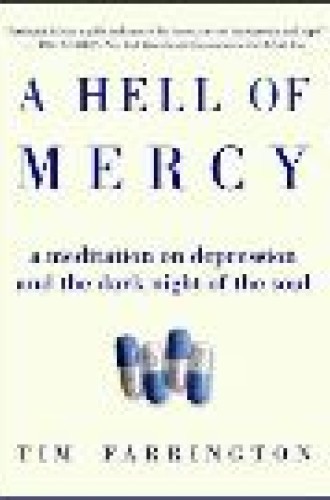Jesus Wept/A Hell of Mercy/Towards the Light/Wrestling with Our Inner Angels
These brief but potent books are welcome additions to the conversation about the thorny relationship between faith, depression and mental illness. In an era when polarizing stances are demanded of us—Do you believe in pharmaceuticals or in faith?—these books are appealingly modest and practical, relying not on intractable ideologies but on shared stories and voices of experience.
We have come a long way from the era when a woman was told, “You can’t be depressed; you’re a nun.” But as Episcopal priest Barbara Crafton points out, many Christians still deny the reality of their depression because it seems like a deficiency of faith. Her Jesus Wept is full of good storytelling from her own experience of depression and from people she has counseled. A realist, Crafton maintains a refreshing tone: “There is abundant devotional writing about the teaching purpose of suffering, and I can’t stand any of it.” The reassurance she offers is genuine and faith-based: “We can reach out for help when we need it, and we can tell the truth about those moments. . . . We can acknowledge that this life is not all there is.”
Whereas Crafton’s book is full of the voices of other people, Tim Farrington’s is all his own. He defines himself as a veteran of mental illness, “writing for those whose maps have given out, as mine did along the way.” He prays: “God help me to do it truly.” In a brazen, breezy and sometimes angry manner, he tells, in A Hell of Mercy, the story of his life as an artist who once regarded depression as integral to his creative process and feared that medication would dull his senses. Religion didn’t seem to hold the answers: “I didn’t want a cross,” Farrington recalls, “I was looking for a second opinion.” He writes about both the usefulness and the limits of psychotherapy, drugs and even introspection. “The best we can hope for under our own steam,” he concludes, “is to be modest and realistic in our ordinary sinfulness as we try our ordinary human best to be decent.”
In his eighties, Denis Duncan, a retired Church of Scotland minister, experienced several crises, “each of which,” he writes in Towards the Light, “was serious enough to threaten my future.” He endured a breakdown in his mental and physical health, suffering what a psychiatrist might term situational depression. His response was to keep a devotional diary recording both his emotional numbness and his clinging to faith. Each morning entry records his despair, and each evening entry is a prayer—even when on some nights he admits, “Prayerless, I fall asleep.” He recalls a story about Robert Louis Stevenson, who as a child observed a lamplighter in Edinburgh and proclaimed, “There’s a man punching holes in the darkness.” “I cannot do that, Lord,” Duncan admits. But he musters the strength to ask, “Are you there, Lord, in the darkness?” then continues, “With feelings of apprehension, I await the visit.” Duncan’s tone is honest yet reassuring, and his cultural references will resonate with older readers.
Nancy Kehoe is a clinical instructor in psychology at the Cambridge Health Alliance, affiliated with Harvard Medical School. She is also a nun in the Society of the Sacred Heart. In Wrestling with Our Inner Angels she recounts her experiences as a self-described interpreter of religious experience to medical professionals and a healer of people damaged by religion. Initially in her professional life she was a “hidden nun,” but she soon saw that in order to help patients, she had to attempt to overcome psychologists’ (dare we call it) paranoia concerning religion.
Therapists “trained to explore every aspect of a person’s life,” Kehoe writes, were simply omitting religion. “The whole story could never be told because no one wanted to listen.” At a staff meeting where she proposed “the formation of a group focusing on religious and spiritual beliefs,” the response was overwhelmingly negative. Someone argued that the patients would try to convert others. Another said that some patients are delusional already and that such a group would validate their delusions. “Fear, anxiety, hesitation, and resistance” were the staff’s only responses, she writes. “No one could see any positive benefit to this idea.” Some of the professionals even declared that having patients participate in a memorial service after a suicide was “inappropriate” for “this population.” But after one such service, a psychiatrist said, “I have never seen the patients so attentive.” Another admitted to being “really touched” and thanked Kehoe for taking the risk.
Reflecting both on her own calling to be a nun and on the various experiences of patients, Kehoe offers fascinating witness to the strength of religious belief in the face of serious adversity. Some of her patients have made statements that are unforgettable. One wrote, “The voices of my illness are frightening. They say, ‘Kill yourself. Kill kill—you are bad.’ But then there is a voice that says to hang on, that ‘I am here. I won’t abandon you.’” Another reported that she was tormented by voices for years and could recognize the difference between that state and the “sense that God was with me.” Her poignant reflection stands as a summary of what we know and don’t know about mental illness and religious experience. “I know I have a rational mind and a spiritual mind,” the patient wrote. “I know I can also get misguided. When I think God wants me to commit suicide, I know I am misguided. With meds, I can be more rational, less emotional. . . . Yet even with meds, I haven’t mistrusted my experience. In this country, they can call religious experience what they will. I know when I am being guided along the way.”
Kehoe concludes her book with a “Religious History Questionnaire” that therapists can use in determining areas to explore “in order to understand the positive or negative aspects of a person’s religious experience.” I suspect that many pastors would find it helpful in counseling parishioners who are brimful of religious or spiritual history but have little vocabulary with which to express or examine it.







